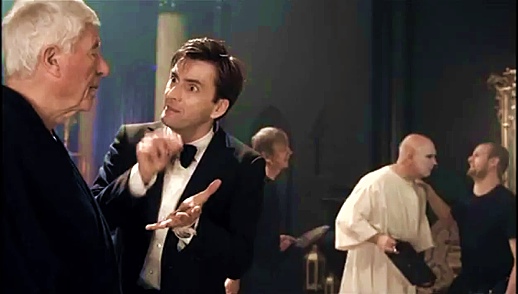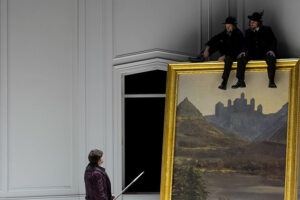

Well, ladies and gentlemen, what was the matter? Well-bred members of everyday bourgeois society turned into screaming furies, ladies in long, dark gowns shook their fists like avenging goddesses, dinner jackets and tuxes became battle dress. The hall was filled with loud bleats and roars, and black clouds of noise assaulted sensitive nerves.
So what on earth was going on? I’m talking about Chéreau’s and Boulez’s “Ring” in Bayreuth, Neuenfels’s “Aida” in Frankfurt, Flimm’s “Hoffmann” in Hamburg and many others who had committed sins against—well, what, exactly? Against the work, against the spirit, against music, against decency, against the entire bürgerlich Western World of lovely sounds and aesthetic discrimination! Scandals like that have been going on for as long as I can remember or have been going to the theater. Whence all this hothouse hypersensitivity?
Most people have a mobile phone, which we Germans idiotically call “handys.” I too once had one of those thick briquettes, you had to flip them open, they were almost too heavy to hold in two hands, keeping them about you was torture, no suit pocket was big enough and they bulged out very inelegantly. And still, it was beautiful. Why don’t we cling to yesterday in things like that? Yet all it takes is for something on our stages to go off track and everyone’s wild with rage. Curiosity gets left at home. The status quo is a safe companion, like a trusty guide dog.
THE DIRECTOR SITS AND BROODS
The great Polish man of the theater Jan Kott said Hamlet is like a sponge—he absorbs the present. Of course, a classic is preserved for us when it becomes classical—when it outlives its own era and can walk and talk in our present, and once again reveals its core, the inmost thing that holds it together. Hamlet, exactly. What core should we remain faithful to? If Kott’s idea is right, Hamlet constantly reflects something new. So there’s no part that’s mandatory. Shakespeare himself lied, fudged, even stole, plagiarized. Was he even the author at all? That’s really a dubious foundation for debates about staying faithful to the work!
So what is a director of this work and other works supposed to do? He sits and broods and reads what has gone before, in stacks and stacks of secondary literature, and finally he finds a way he now wants to develop with his actors (things are similar too with an opera, but also completely different!).
And when, after weeks of rehearsing, talking, discussion, things have somehow got to that point, up goes the curtain and we look at it: enthusiasm, shock, disapproval, bravos, boos are the response.
Let’s take another look at Chéreau’s Bayreuth “Ring”; I bet you can’t see the scandal any more. Costumes? Old-fashioned tat. The narrative method? No scandal to be found. You can’t find it in any of those plays or operas I mentioned at the start.
What does that mean for us? There is no ultimate perspective on a work that sets the basic tone of an interpretation for all eternity—and also, especially, no form: fashions change faster than the sun and moon. Maestro Mozart’s famed “Cosi fan tutte” serves as evidence: for a good while this masterpiece languished in the shadows. Then a naughty German version came along: women are like that, and yes, yes, so are men! The men! Especially goofy in this work—except for Alfonso, who pulls a nasty prank on them all. Is this a work about sweet inconstancy? Or is it a gruesome experiment à la Marivaux, a chilly round of open-heart surgery?
So does the idea of being faithful to the work really imply what many a reactionary comfortingly assumes as he yearns to turn back the wheels of time? And what about the other affront, the sibling of “fidelity to the work”: “regie theater.” Who knows where such nonsense comes from. Since the invention of the rehearsal manager—in other words, of interpretation—he has existed, the master of all classes, the angel and devil, the director, who robs us of our rendezvous with our good buddies and warm-hearted lady friends. But as we’ve already noticed, often enough the bogeyman director becomes an angel later on, like the sainted Patrice Chéreau and the radiant Hans Neuenfels—I myself have even had such things happen to me.
TRANSLATOR TO A STAGE EVENT
What does this hated thing the director actually do? Let’s say very modestly, actually he’s a translator, as though from a two-dimensional language into a three-dimensional stage event, from the script directly onto the boards, which are supposed to represent the world, holding the mirror up to nature, says Hamlet, (that ambivalent fellow!). But so far as possible, the director is supposed to communicate his view of the world to us. And hope that we can follow him and his way, which he—so to speak as the first of all viewers—develops for us with his team before, on and behind the stage. If he doesn’t manage to draw us into the dialogue, to carry us on a journey with him—then he’s failed at his job.
Except that all this has nothing at all to do with fidelity and so-called “regie theater.” There is no such thing as theater without Regie (direction)—otherwise it’s just literature. There is good and bad, breath-taking and deadly boring. Likewise there’s no such thing as “Personenregie.” Directing includes everything! Next door in France they call it “metteur en scène”—the fellow who puts things on the stage, he places everything into the scene, so he “stages” not just the people, but the set, the costumes, the lights, the props, the masks and wigs—everything, with his team—and other nifty things like deadly duels, climbing balconies, murders of every kind, and sweet kisses. The conductor of course is another translator.
Interestingly, these debates are possible only among us in the theater arts, because we live in the utopian No Man’s Land of the present. In a sense, we don’t exist at all. A picture is a picture is a picture; you can change it only by damaging it. Painting it over, for example. But then you can’t see or make out anything more. Otherwise, it remains as it was, eternally and forever. It’s no different with books. They sit on the shelf and stay there whether they’re read or not—they exist eternally and forever. Film too, shot, edited, mixed, on celluloid in the theater, on DVD, or whatever’s next—nobody has to look at that either, but it remains, eternally and forever. Only theater, the opera, music, evaporates in an unreal moment and remains—eternally and forever in our heads, in memory. The rest is silence. Our time is ours, let’s hold on to it, it will leave us faster than we can direct ourselves not to blink.
Jürgen Flimm is a director, and starting this season the Intendant at the Staatsoper im Schiller-Theater. This is an excerpt from his address “The Error of Fidelity to the Work” at the American Academy in Berlin.























Comments